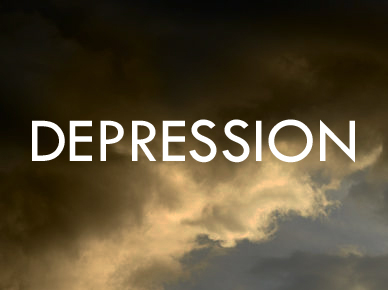Depression
She often gets ignored – even when she screams.
Can you imagine what this is like for her? You walk into a room and the people there will not even look at you. You wave and say “hello,” but still, there is no response. You decide that maybe they don’t hear you or see you wave, so you try again, getting louder and waving a bit more demonstratively. The only response you get is them turning their backs. It seems that others just wish you would go away. OUCH!
 It helps to personify Depression, doesn’t it? She often gets ignored by others or unacknowledged simply because people do not understand her cause. Others will acknowledge her but if they are honest, they just want her to go away. They might think that more prayer, more bible studies, more exercise, or a positive attitude will erase all the despair, and when it does not, they are faced with their own questions and sense of powerlessness. Given that we do not like feeling powerless, we look away from the “person,” searching for answers and for something we can control, not realizing the wake of our neglect.
It helps to personify Depression, doesn’t it? She often gets ignored by others or unacknowledged simply because people do not understand her cause. Others will acknowledge her but if they are honest, they just want her to go away. They might think that more prayer, more bible studies, more exercise, or a positive attitude will erase all the despair, and when it does not, they are faced with their own questions and sense of powerlessness. Given that we do not like feeling powerless, we look away from the “person,” searching for answers and for something we can control, not realizing the wake of our neglect.
An article from 2007 posted on CNN discusses a Romanian orphanage, highlighting the fact that care and attention to one’s needs are crucial not only for survival but for thriving. It reads: “We filmed Dr. Nicoara and her charges at the Baia Mare hospital in northern Romania. Some of the older babies who could sit up were rocking – child welfare experts say that’s a sign that they’re suffering from a lack of stimulation. I noticed something else odd about the ward – the babies weren’t crying. There were a dozen little ones there and they were all quiet. They’d given up on crying. That above all was hard to learn – the best way babies can communicate their needs and these ones had given up. They had learned that crying didn’t get them what they wanted. How could it – when there were 23 of them to care for and just three nurses on the ward?”
Those tiny wonders needed someone to pay attention to their needs. Their scream was supposed to help them survive. Part of the nature of depression is to stop crying because “what’s the point?” But can we listen to and see needs and offer care instead of ignorance? Can we pay attention to what is going on in and around us? If care and attention to needs are crucial for survival, we have to be willing to witness the need as well as our own sense of powerlessness.
 Mollie Johnston is a Counselor for The Barnabas Center. She has her Bachelor of Arts from the University of Tennessee where she majored in Spanish as well as her Master of Arts in Christian Counseling from Gordon-Conwell Theological Seminary. She is especially passionate about helping individuals who are working through grief, doubts, trauma, relationships, anxiety, depression, self-esteem/identity issues, seasons of loneliness, family of origin issues, and divorce.
Mollie Johnston is a Counselor for The Barnabas Center. She has her Bachelor of Arts from the University of Tennessee where she majored in Spanish as well as her Master of Arts in Christian Counseling from Gordon-Conwell Theological Seminary. She is especially passionate about helping individuals who are working through grief, doubts, trauma, relationships, anxiety, depression, self-esteem/identity issues, seasons of loneliness, family of origin issues, and divorce.








2 comments
Good article. Mostly, the church does not want to really listen to pain or to hear a person’s full story, or to hold space for the grieving when they have to be a part of the healing and there is a cost. The cost is often relationship; redemptive relationship. Too few nurses in the orphanage, yes.
Thanks for taking the time to read, Gwen. And thank you for your thoughts. So true that that can be the case and neat that He can use us to offer a different kind of care and attention as well as invite others along.